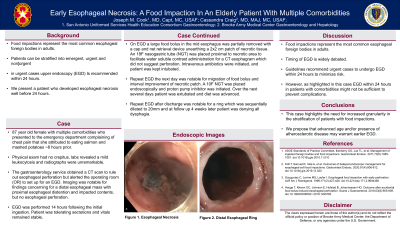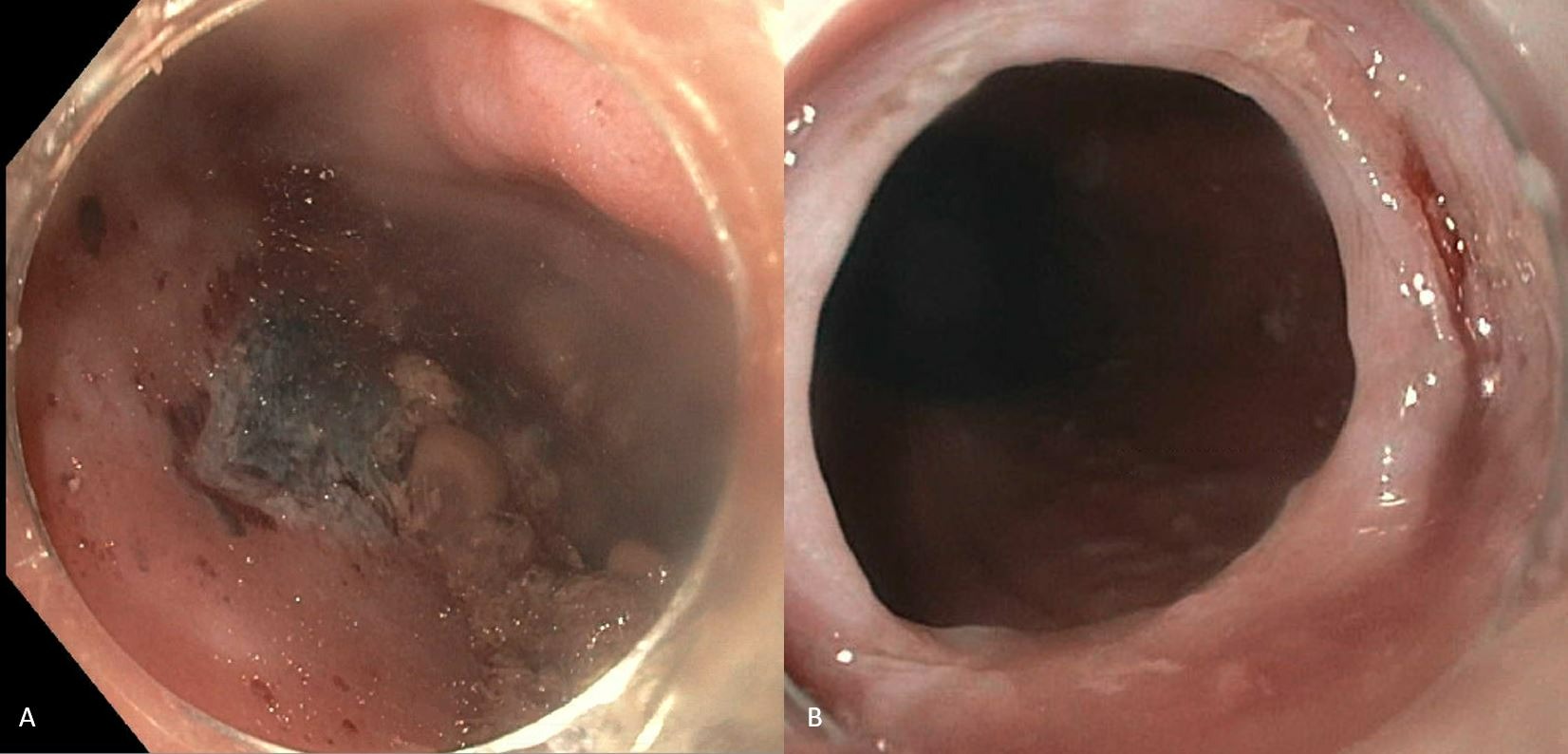Back


Poster Session D - Tuesday Morning
Category: General Endoscopy
D0299 - Early Esophageal Necrosis: A Food Impaction in an Elderly Patient With Multiple Comorbidities
Tuesday, October 25, 2022
10:00 AM – 12:00 PM ET
Location: Crown Ballroom

Has Audio
- JC
Joseph Cook, MD
Brooke Army Medical Center Gastroenterology Fellowship
Fort Sam Houston, TX
Presenting Author(s)
Joseph Cook, MD, Cassandra Craig, MD
Brooke Army Medical Center Gastroenterology Fellowship, Fort Sam Houston, TX
Introduction: Food impactions represent the most common esophageal foreign bodies in adults. Patients can be stratified into emergent, urgent and non-urgent, and in urgent cases upper endoscopy (EGD) is recommended within 24 hours. We present a patient who developed esophageal necrosis well before 24 hours.
Case Description/Methods: This is a 87 year old female with multiple comorbidities who presented to the emergency department complaining of chest pain that she attributed to eating salmon and mashed potatoes ~6 hours prior. Physical exam had no crepitus, labs revealed a mild leukocytosis and radiographs were unremarkable. The gastroenterology service obtained a CT scan to rule out esophageal perforation but alerted the operating room (OR) to set up for an EGD. Imaging was notable for findings concerning for a distal esophageal mass with proximal esophageal distention and impacted contents, but no esophageal perforation. EGD was performed 14 hours following the initial ingestion. Patient was tolerating secretions and vitals remained stable. On EGD a large food bolus in the mid esophagus was partially removed with a cap and net retrieval device unearthing a 2x2 cm patch of necrotic tissue. An 18F nasogastric tube (NGT) was placed proximal to necrotic area to facilitate water soluble contrast administration for a CT esophagram which did not suggest perforation. Intravenous antibiotics were initiated, and patient was kept intubated. Repeat EGD the next day was notable for migration of food bolus and interval improvement of necrotic patch. A 10F NGT was placed endoscopically and proton pump inhibitor was initiated. Over the next several days patient was extubated and diet was advanced. Repeat EGD after discharge was notable for a ring which was sequentially dilated to 20mm and at follow up 4 weeks later patient was denying all dysphagia.
Discussion: Food impactions represent the most common esophageal foreign bodies in adults. Timing of EGD is widely debated. Guidelines recommend urgent cases to undergo EGD within 24 hours to minimize the risk. However, as highlighted in this case EGD within 24 hours in patients with comorbidities might not be sufficient to prevent complications. This case highlights the need for increased granularity in the stratification of patients with food impactions. We propose that advanced age and/or presence of atherosclerotic disease may warrant earlier EGD.

Disclosures:
Joseph Cook, MD, Cassandra Craig, MD. D0299 - Early Esophageal Necrosis: A Food Impaction in an Elderly Patient With Multiple Comorbidities, ACG 2022 Annual Scientific Meeting Abstracts. Charlotte, NC: American College of Gastroenterology.
Brooke Army Medical Center Gastroenterology Fellowship, Fort Sam Houston, TX
Introduction: Food impactions represent the most common esophageal foreign bodies in adults. Patients can be stratified into emergent, urgent and non-urgent, and in urgent cases upper endoscopy (EGD) is recommended within 24 hours. We present a patient who developed esophageal necrosis well before 24 hours.
Case Description/Methods: This is a 87 year old female with multiple comorbidities who presented to the emergency department complaining of chest pain that she attributed to eating salmon and mashed potatoes ~6 hours prior. Physical exam had no crepitus, labs revealed a mild leukocytosis and radiographs were unremarkable. The gastroenterology service obtained a CT scan to rule out esophageal perforation but alerted the operating room (OR) to set up for an EGD. Imaging was notable for findings concerning for a distal esophageal mass with proximal esophageal distention and impacted contents, but no esophageal perforation. EGD was performed 14 hours following the initial ingestion. Patient was tolerating secretions and vitals remained stable. On EGD a large food bolus in the mid esophagus was partially removed with a cap and net retrieval device unearthing a 2x2 cm patch of necrotic tissue. An 18F nasogastric tube (NGT) was placed proximal to necrotic area to facilitate water soluble contrast administration for a CT esophagram which did not suggest perforation. Intravenous antibiotics were initiated, and patient was kept intubated. Repeat EGD the next day was notable for migration of food bolus and interval improvement of necrotic patch. A 10F NGT was placed endoscopically and proton pump inhibitor was initiated. Over the next several days patient was extubated and diet was advanced. Repeat EGD after discharge was notable for a ring which was sequentially dilated to 20mm and at follow up 4 weeks later patient was denying all dysphagia.
Discussion: Food impactions represent the most common esophageal foreign bodies in adults. Timing of EGD is widely debated. Guidelines recommend urgent cases to undergo EGD within 24 hours to minimize the risk. However, as highlighted in this case EGD within 24 hours in patients with comorbidities might not be sufficient to prevent complications. This case highlights the need for increased granularity in the stratification of patients with food impactions. We propose that advanced age and/or presence of atherosclerotic disease may warrant earlier EGD.

Figure: A: Esophageal necrosis. B: Esophageal ring.
Disclosures:
Joseph Cook indicated no relevant financial relationships.
Cassandra Craig indicated no relevant financial relationships.
Joseph Cook, MD, Cassandra Craig, MD. D0299 - Early Esophageal Necrosis: A Food Impaction in an Elderly Patient With Multiple Comorbidities, ACG 2022 Annual Scientific Meeting Abstracts. Charlotte, NC: American College of Gastroenterology.

